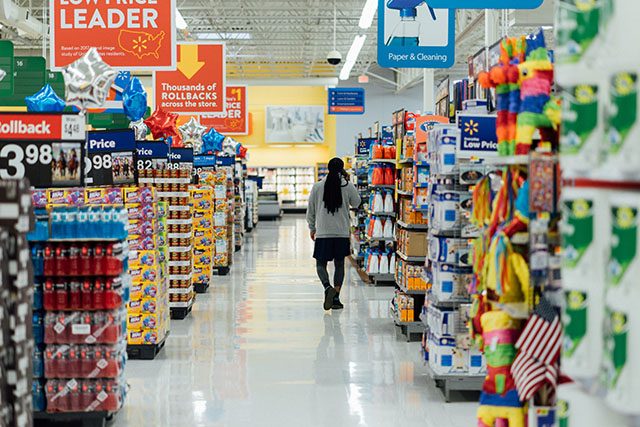Many Filipinos, especially in Metro Manila, are hoarding alcohol, toilet paper and other supplies from supermarkets following the surge of confirmed cases of the novel coronavirus in the country.
After nearly a month of not detecting any new infections, the Department of Health reported dozens of new confirmed cases this March, bringing the total number to 49 as of Thursday morning.
The new reported patients who tested positive for COVID-19 last Monday, March 10, are being cared for in hospitals around Metro Manila.
Filipinos were then seen making bulk purchases of rolls of tissue paper, alcohol and face masks.
Rep. Ruffy Biazon (Muntinlupa) shared photos of grocery carts loaded with packs of tissue paper.
The sign on the photos showed they were captured at a branch of S&R Shopping Center.
“Panic buying for toilet paper comes to Metro Manila,” Biazon wrote in the caption.
Panic buying for toilet paper comes to Metro Manila … pic.twitter.com/0A1Ryj6Lwa
— Ruffy Biazon (@ruffybiazon) March 10, 2020
A Facebook user also showed a photo of two Filipinos filling up their grocery baskets with various brands of rubbing alcohol.
The user claimed that these products might be sold online at a higher price.
“Other country: nag papanic buying para may gamitin. My country: nag papanic buying para mabenta ng doble dobleng presyo,” the user said in the caption.
The post made rounds on Facebook more than 29,000 times.
Other country: nag papanic buying para may gamitinMy country: nag papanic buying para mabenta ng doble dobleng…
Posted by Ivy Lexynne on Tuesday, March 10, 2020
These posts prompted a number of public figures to warn their followers against the consequences of such activities in times of crisis.
TV host and model Bianca Gonzales shared a screenshot of an Instagram post from actress Bianca Manalo telling people that hoarding will later cause shortage to the less fortunate.
“Please, please do not hoard. Pity our fellow Filipinos who live on their daily wages, who can only afford to buy what they need when they receive their daily or weekly salaries. When they go to buy their needs, the shelves will be empty,” Manalo said.
“I hate to say it but it’s the upper class that will cause the shortage and could cause price increases. Pantries will be full in the exclusive villages, while the poorer man will have little choices,” she added.
— Bianca Gonzalez (@iamsuperbianca) March 10, 2020
Supreme Court Associate Justice Marvic Leonen also expressed the same sentiment on Twitter, saying that this behavior during difficult times is “unethical.”
“Hoarding during times of crisis is unethical. It is a practice that privileges those who can afford callously depriving those whose resources only allow them to survive on daily minimum wages the nourishment and protection for their own families,” Leonen said.
The economic impact of the worldwide spread of the new pathogen is evident when supermarkets ran out of stock of supplies in various countries, including the Philippines.
Why people resort to panic buying
According to psychologists, such behavior or response to crisis happens because a person’s inherent sense of control gets violated or lost.
“People are really not equipped psychologically to process this type of thing. So that just makes it worse for a lot of people in terms of uncertainty, and then they do whatever they need to do to try and get back some control,” a marketing professor named Andrew Stephen was quoted as saying in a TIME article published March 10.
There is also no basis for the stockpiling of toilet paper, which has not been proven to prevent the virus. In Australia where there is roughly the same number of confirmed cases as the Philippines, the chief state doctor told parliament that “removing all of the lavatory paper from the shelves of supermarkets probably isn’t a proportionate or sensible thing to do at this time.”
“Removing all of the lavatory paper from the shelves of supermarkets probably isn’t a proportionate or sensible thing to do at this time.”
Humans are also not good at dealing with uncertainty, another therapist said in a recently published Huffington Post article. This negative emotion is brought by the daily consumption of news of people dying or feeling ill because of the virus.
“Listening to that kind of news, day in day out, is going to trigger our survival instinct even more. Generally human beings aren’t very good at dealing with uncertainty, this is their way of having some certainty,” Hansa Pankhania was quoted as saying.
The World Health Organization recently warned industry leaders and governments against this hoarding, misuse and panic buying of personal protective equipment.
“Industry and governments must act quickly to boost supply, ease export restrictions and put measures in place to stop speculation and hoarding. We can’t stop COVID-19 without protecting health workers first,” said WHO Director-General Dr Tedros Adhanom Ghebreyesus.
In the Philippines, the Department of Trade and Industry also discouraged Filipinos of hoarding protective equipment and food items.
“Ang dami pang laman ng mga grocery. Hindi kailangan mag-stockpile,” Trade Secretary Ramon Lopez said.
“Monitored natin ang prices lalo na ang basic necessities… ‘Wag magpanic at huwag ubusin ‘yung laman ng grocery. Hindi kailangan,” he added.










